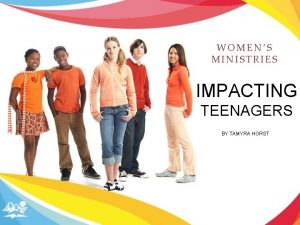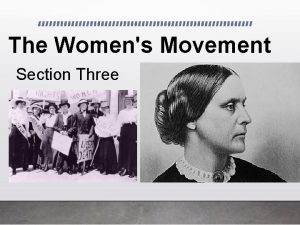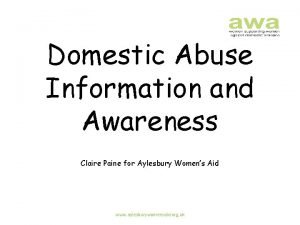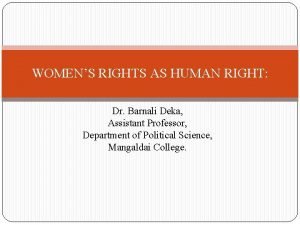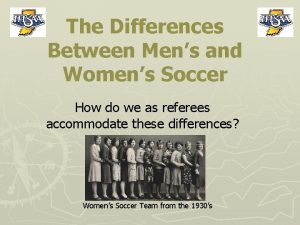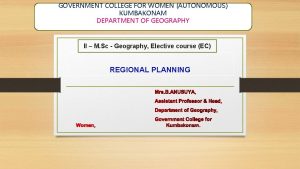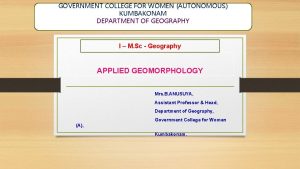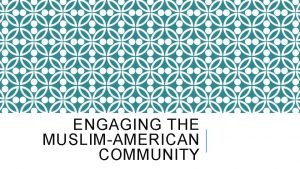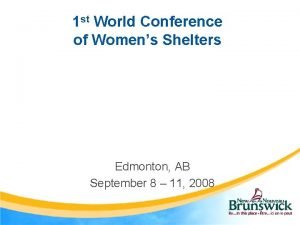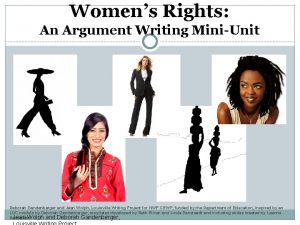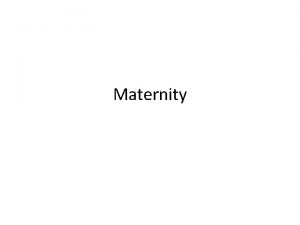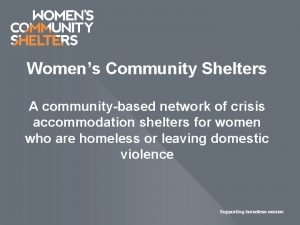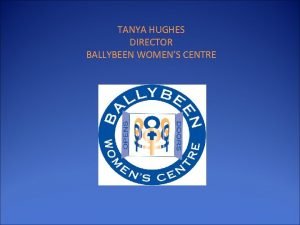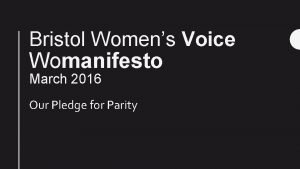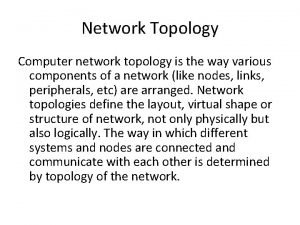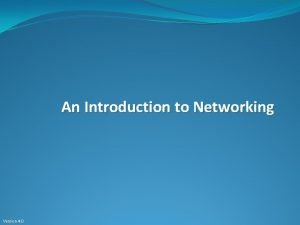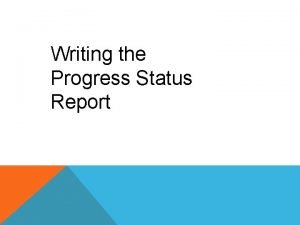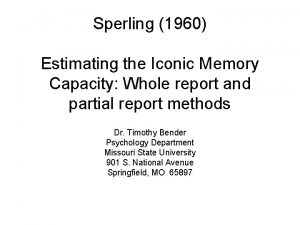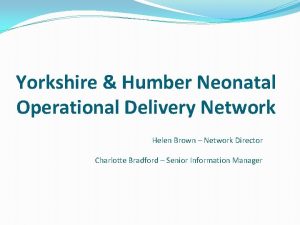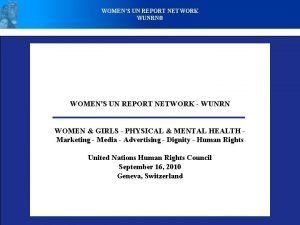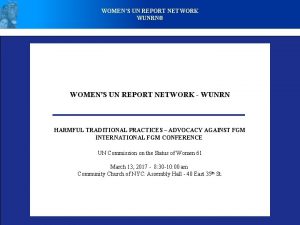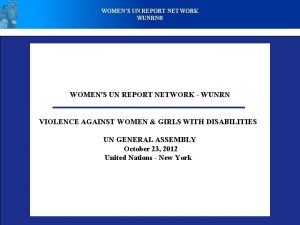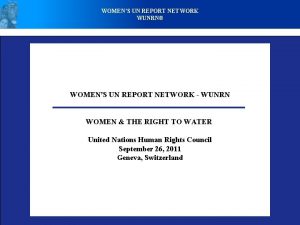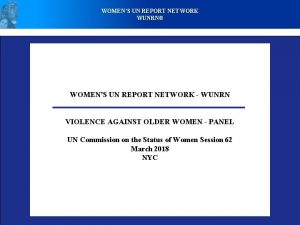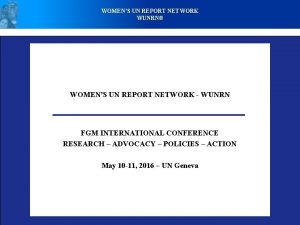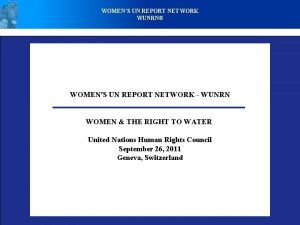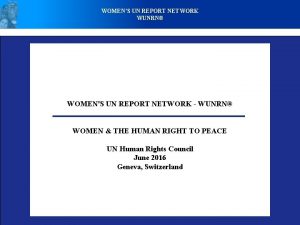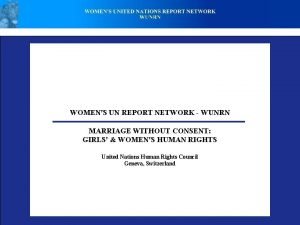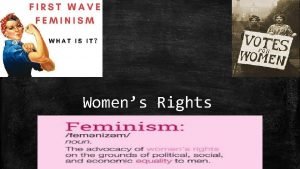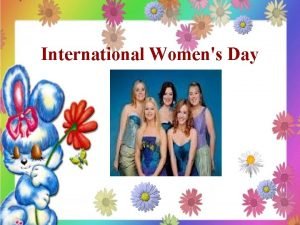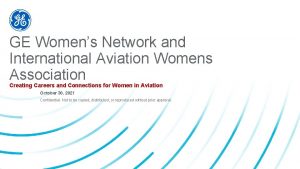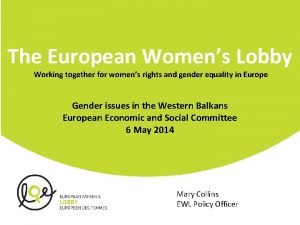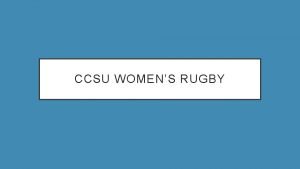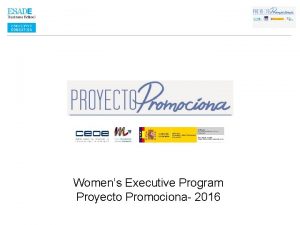WOMENS UN REPORT NETWORK WUNRN WOMENS UN REPORT


























- Slides: 26

WOMEN’S UN REPORT NETWORK WUNRN® WOMEN'S UN REPORT NETWORK - WUNRN WOMEN & THE RIGHT TO WATER United Nations Human Rights Council September 26, 2011 Geneva, Switzerland


WOMEN’S UN REPORT NETWORK WUNRN® WOMEN AT THE WELL - INDIA

WOMEN’S UN REPORT NETWORK WUNRN® HUMAN RIGHT TO WATER IS INDISPENSABLE FOR DIGNITY. UNITED NATIONS E Economic and Social Council Distr. GENERAL E/C. 12/2002/11 20 January 2003 COMMITTEE ON ECONOMIC, SOCIAL AND CULTURAL RIGHTS Twenty-ninth session Geneva, 11 -29 November 2002 Agenda item 3 Original: ENGLISH SUBSTANTIVE ISSUES ARISING IN THE IMPLEMENTATION OF THE INTERNATIONAL COVENANT ON ECONOMIC, SOCIAL AND CULTURAL RIGHTS General Comment No. 15 (2002) The right to water (arts. 11 and 12 of the International Covenant on Economic, Social and Cultural Rights) I. INTRODUCTION 1. Water is a limited natural resource and a public good fundamental for life and health. The human right to water is indispensable for leading a life in human dignity. It is a prerequisite for the realization of other human rights. The Committee has been confronted continually with the widespread denial of the right to water in developing as well as developed countries. Over one billion persons lack access to a basic water supply, while several billion do not have access to adequate sanitation, which is the primary cause of water contamination and diseases linked to water. [1] The continuing contamination, depletion and unequal distribution of water is exacerbating existing poverty. States parties have to adopt effective measures to realize, without discrimination, the right to water, as set out in this general comment.

WOMEN’S UN REPORT NETWORK WUNRN® SOMALIA - FLEEING THE DROUGHT CRISIS - WOMEN & CHILDREN

WOMEN’S UN REPORT NETWORK WUNRN®

WOMEN’S UN REPORT NETWORK WUNRN® International Human Rights Treaties with Explicit Reference to Safe Drinking Water and Sanitation Convention on the Elimination of Article 14 (2) All Forms of Discrimination States parties shall take all appropriate measures to eliminate discrimination against women in rural areas in order against Women (CEDAW) to ensure, on a basis of equality of men and women, that they participate in and benefit from rural development and, in particular shall ensure to women the right: … (h) To enjoy adequate living conditions, particularly in relation to housing, sanitation, electricity and water supply, transport and communications. The Committee on the Elimination of Discrimination against Women considered that this article obliges States parties to take all appropriate measures to ensure adequate living conditions in relation to water and sanitation, which are critical for the prevention of diseases and the promotion of good health care. ( Committee on the Elimination of Discrimination against Women, general recommendation No. 24 (1999) on article 12 of the Convention (women and health), para. 28) Convention on the Rights of the Child (CRC) Article 24 1. States parties recognize the right of the child to the enjoyment of the highest attainable standard of health and to facilities for the treatment of illness and rehabilitation of health … 2. States parties shall pursue full implementation of this right and, in particular, shall take appropriate measures: (c) To combat disease and malnutrition, including within the framework of primary health care, through, inter alia, (…) the provision of adequate nutritious foods and clean drinking water (…) The United Nation Committee on the Rights of the Child underlined that under article 24 States have a responsibility to ensure access to clean drinking water and that such access is particularly essential for young children’s health. ( Committee on the Rights of the Child, general comment No. 7 (2006) on implementing child rights in early childhood, para. 27)

WOMEN’S UN REPORT NETWORK WUNRN® WOMEN & GIRLS - THE HUMAN RIGHT TO WATER *Clean & Safe Water *Adequate Water *Accessible Water & In Safety *Affordable or Free Water *Water for Health, Home, Agriculture & Other Work, Schools, Hospitals +

WOMEN’S UN REPORT NETWORK WUNRN® HAITI GIRL CHILD - WALKING BAREFOOT THROUGH MISERY UNICEF Prize Photo

WOMEN’S UN REPORT NETWORK WUNRN®

WOMEN’S UN REPORT NETWORK WUNRN® UN MILLENNIUM DEVELOPMENT GOALS GOAL 7: ENSURE ENVIRONMENTAL SUSTAINABILITY Target 7. C: Halve, by 2015, the proportion of the population without sustainable access to safe drinking water and basic sanitation • The world is on track to meet the drinking water target, though much remains to be done in some regions • Accelerated and targeted efforts are needed to bring drinking water to all rural households • Safe water supply remains a challenge in many parts of the world • With half the population of developing regions without sanitation, the 2015 target appears to be out of reach • Disparities in urban and rural sanitation coverage remain daunting • Improvements in sanitation are bypassing the poor

WOMEN’S UN REPORT NETWORK WUNRN® UN SPECIAL RAPPORTEUR ON THE RIGHT TO SAFE DRINKING WATER & SANITATION WATER, SANITATION, & THE MDG'S Human Rights Council resolution 7/22 requests the Special Rapporteur (then Independent Expert) to make recommendations that could help the realization of the Millennium Development Goals, in particular of Goal 7. To carry out this task, she consulted with numerous actors working on the MDGs related to water and sanitation and carried out research on that topic. She presented a report to the General Assembly in October 2010 analyzing the MDGs targets on water and sanitation from a human rights perspective, and made recommendations on how these targets could be better aligned with human rights criteria. She continues to work closely with UNICEF and WHO, who run the Joint Monitoring Programme, which is responsible for reporting on progress towards the MDG targets on water and sanitation, .

WOMEN’S UN REPORT NETWORK WUNRN® UN Special Rapporteur on Water & Sanitation Ms. Catarina de Albuquerque "Unfortunately, but unsurprisingly, those who suffer the most from lack of access to water and sanitation, are the poorest, the most marginalized and the most vulnerable, " asserts Ms. de Albuquerque, noting in particular the situation of women, children, and persons with disabilities.

WOMEN’S UN REPORT NETWORK WUNRN® WOMEN CARRYING WATER

WOMEN’S UN REPORT NETWORK WUNRN® WOMEN & GIRLS - THE RIGHT TO WATER - INTERSECTIONALITIES *Poverty *Climate Change Issues *Natural Disasters *Education *Child Labour *Nutrition/Malnutrition *Health - Physical & Mental Reproductive Health *Maternal & Infant Mortality *Land, Housing/Shelter Land-Grabbing, Forced Evictions Homelessness - Slums *War & Conflict *Refugee Status *Internal Displacement *Safety - Violence - Rape *Migration *Minority & Indigenous Issues *Culture & Traditions *Widows Discrimination

WOMEN’S UN REPORT NETWORK WUNRN® TAJIKISTAN - GIRL CARRYING WATER This girl should be in school.

WOMEN’S UN REPORT NETWORK WUNRN® WOMEN & SLUMS - NAIROBI, KENYA

WOMEN’S UN REPORT NETWORK WUNRN® RIGHT TO WATER & SANITATION IN EMERGENCIES - WOMEN & CHILDREN

WOMEN’S UN REPORT NETWORK WUNRN® IRAQ - WOMEN ON FRONTLINES OF WAR - RIGHT TO WATER? © Panos Pictures / M. Saman

WOMEN’S UN REPORT NETWORK WUNRN® PAKISTAN - INTERNALLY DISPLACED WOMEN & CHILDREN IRIN Photo

WOMEN’S UN REPORT NETWORK WUNRN® JAPAN - EARTHQUAKE & TSUNAMI UN Special Rapporteur on Water Statement after Mission to Japan: “I met in Japan an old woman near Kyoto, who lived in a community with no sewage system. This woman, almost 90 years old, still had to collect her water from a well; she did not have piped water in her house. And why did this happen? It happened because she belongs to a minority, she belongs to a Korean minority and because the community she lives in is entrenched in a legal dispute over the ownership of the land where they are living. "

WOMEN’S UN REPORT NETWORK WUNRN® BANGLADESH - CYCLONE - WOMEN - WATER

WOMEN’S UN REPORT NETWORK WUNRN® TO UNDERSTAND WOMEN & WATER *FOLLOW THE MONEY *WATCH THE POLITICS & POWER *CONSIDER GLOBALIZATION *SEE IMPACT OF BUSINESS/INDUSTRY *NOTE LAND & PROPERTY RIGHTS *LOOK AT CORRUPTION MULTILEVEL *STUDY MULTI NATIONAL AGREEMENTS *CHALLENGE PATRIARCHAL CONTROL *SEE POLARIZATION OF THE POOR, SPREADING OF THE CLASSES *LOOK FOR HUMAN RIGHTS

WOMEN’S UN REPORT NETWORK WUNRN® WATER IS MOVING FROM A BASIC HUMAN RIGHT TO A PROFITABLE CORPORATE COMMODITY.

WOMEN’S UN REPORT NETWORK WUNRN® NIGERIA DELTA - WATER POLLUTION CRISIS FROM CORPORATE OIL

WOMEN’S UN REPORT NETWORK WUNRN® MAMA, I'M THIRSTY Mama, I'm thirsty, and hungry My tummy hurts, also at night, My hair and skin are now so dry. I am only 8 years old. My baby brother cries. He is hungry, too. You say your milk has stopped. You need food and safe water. Daddy died some months ago. Villagers say he killed himself. There were so many debts. He tried to find water and food for us. You say I can't go to school. I must carry water so we can live. The water vase is large and very heavy Almost as large as I am, Mama. The nearby stream and well are dry. I walk so far, now twice a day. I stand in line then at the well. Will I ever learn to read? Become a teacher? You married off my big sister Now one less mouth to feed here. But I know she's not happy. Her eyes are sad and full of fear. Will we lose our house as well? Without home and land, can we survive? I am so very thirsty, Mama. Can we really stay alive? Will I grow up? I am not so sure. I get very sick. I cannot play. You talk about the big city. But where there would we stay? I have hopes and I have dreams. They seem so far away. Like our water, dreams disappear. I can only hope and pray. Mama, I'm Thirsty! WUNRN - 2011
 Womens ministry activities
Womens ministry activities Womens rights
Womens rights Late night womens hour
Late night womens hour Aylesbury womens aid
Aylesbury womens aid Womens right
Womens right Difference between mens and womens soccer
Difference between mens and womens soccer Womens college kumbakonam
Womens college kumbakonam Womens college kumbakonam
Womens college kumbakonam Womens right
Womens right Womens shelter edmonton
Womens shelter edmonton Womens rights
Womens rights Female genital system
Female genital system Womens history month door
Womens history month door Womens community shelters
Womens community shelters Ballybeen womens centre
Ballybeen womens centre Scarborough womens centre
Scarborough womens centre Lacrosse helmet mens
Lacrosse helmet mens Bristol womens voice
Bristol womens voice Datagram network
Datagram network Topology in computer
Topology in computer Features of peer to peer network and client server network
Features of peer to peer network and client server network Ece 526
Ece 526 Network centric computing and network centric content
Network centric computing and network centric content Packet switched vs circuit switched
Packet switched vs circuit switched Difference between status report and progress report
Difference between status report and progress report Sperling 1960 iconic memory
Sperling 1960 iconic memory Yorkshire neonatal network
Yorkshire neonatal network
